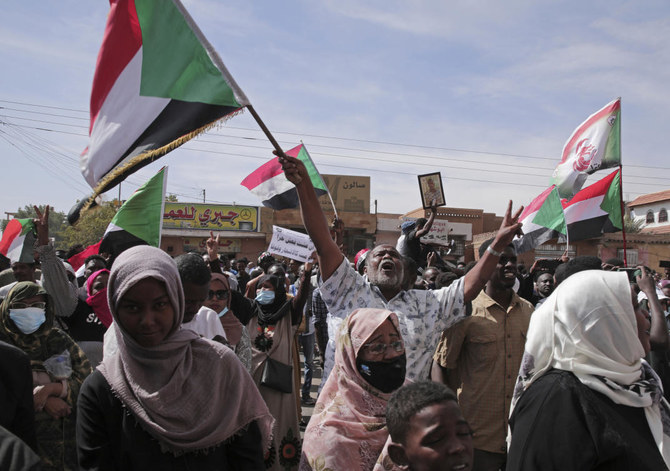LONDON/KHARTOUM: UN Secretary-General Antonio Guterres on Monday condemned the continued violence targeting anti-coup demonstrators in Sudan, his spokesman said.
Guterres called on the “Sudanese security forces to exercise the utmost restraint and adhere to their obligations in relation to the rights to freedom of assembly and expression,” Stephane Dujarric said in a statement.
His comments came a day after Abdalla Hamdok resigned as prime minister after being unable to forge a consensus, throwing a transition toward elections deeper into uncertainty.
Hamdok’s resignation came hours after the latest mass rallies against the military. At least 57 civilians have been killed as security forces have moved to contain or disperse demonstrations since the Oct. 25 coup, according to medics aligned with the protest movement.
Guterres has also “taken note” of Hamdok’s resignation, Dujarric said, adding: “He regrets that a political understanding on the way forward is not in place despite the gravity of the situation in Sudan.”
The military dissolved his government in an October coup, but Hamdok returned a month later under a deal to form a government of technocrats ahead of 2023 elections.
“The secretary-general encourages all stakeholders to continue engaging in meaningful dialogue in order to reach an inclusive, peaceful and lasting solution,” the statement added.
“Sudanese aspirations for a transition that leads to a democratic dispensation are critical (and) the UN remains ready to support these efforts,” it also said.
Secretary-General @antonioguterres condemns the continued violence targeting protestors in #Sudan.
He has also taken note of the resignation of Prime Minister Hamdok and regrets that a political understanding on the way forward is not in place.
More: https://t.co/Zd05cwnI2W
— UN Spokesperson (@UN_Spokesperson) January 3, 2022
The US on Monday also urged Sudanese leaders to ensure civilian rule and end violence against anti-military protesters.
“After Hamdok’s resignation, Sudanese leaders should set aside differences, find consensus and ensure continued civilian rule,” the US State Department’s Bureau of African Affairs tweeted.
Hamdok, an economist and former UN official widely respected abroad, had served as prime minister under a military-civilian power-sharing deal that followed the overthrow of former leader Omar Al-Bashir in 2019.
Some Sudanese were saddened by the loss of a leader whom they said stood out for his wisdom. Others, still angry with Hamdok for returning after the coup, expressed their resolve to end military rule.
“Hamdok didn’t achieve what we needed him to but he also didn’t come out and tell us what the roadblocks were so that we could rally around him and support him,” said Najat, a pharmacist in Khartoum.
Mayada Khairi, an activist, said: “Whether he comes or goes makes no difference for us because our issue became bigger and our war became bigger ... we will continue the revolutionary line.”
Jibril Ibrahim, a former rebel leader who served as finance minister under Hamdok but expressed support for the military before the coup, lamented his resignation.
“Our nation needs political compromise today more than ever to navigate safely through these turbulent times. There is a room to accommodate everyone.”
The United States continues to stand with the people of Sudan as they push for democracy. Violence against protestors must cease.
— Bureau of African Affairs (@AsstSecStateAF) January 2, 2022
Further protests are planned for Tuesday.
Hamdok had been an important partner for foreign nations as Sudan sought to emerge from decades of isolation and sanctions under Bashir and to end an economic crisis, with Western backing.
The UN Special Representative in Sudan, Volker Perthes, also regretted Hamdok’s decision, adding that the crisis risked further derailing progress made since the uprising that helped topple Bashir.
The US State Department said any new appointments should follow the power-sharing deal struck in 2019.
“Sudan’s next PM and cabinet should be appointed in line with the constitutional declaration to meet the people’s goals of freedom, peace, and justice,” it said.
“Violence against protesters must cease.”
France said it “pays tribute to his efforts in support of the democratic transition in Sudan, which made it possible to institute critical reforms that must continue.”
The French foreign ministry issued a statement calling for the reestablishment of the transitional institutions reflecting the democratic aspirations of the Sudanese people.
“Only the appointment of a credible representative government will make it possible to achieve these aspirations, to ease the political climate, and to enable Sudan to chart a path toward elections in 2023, it added.
France also urged authorities to respect the Sudanese people’s right to peacefully express their opinions without fear of violence or reprisals.
(With Reuters)


























